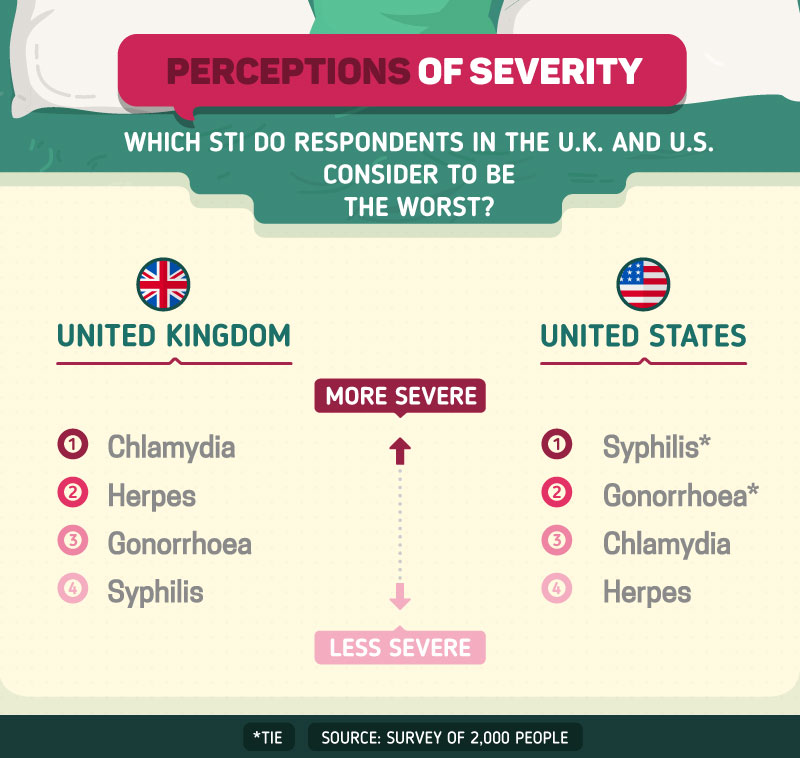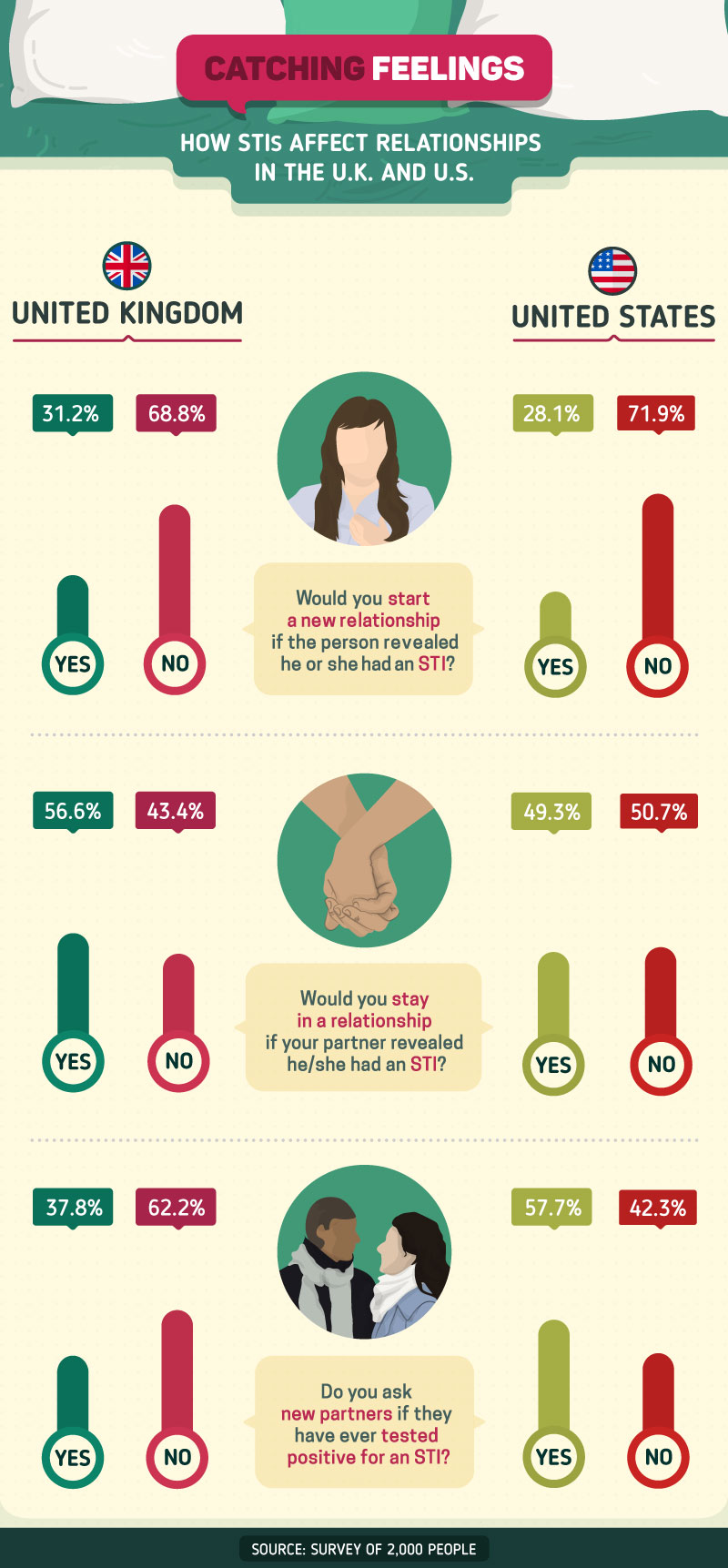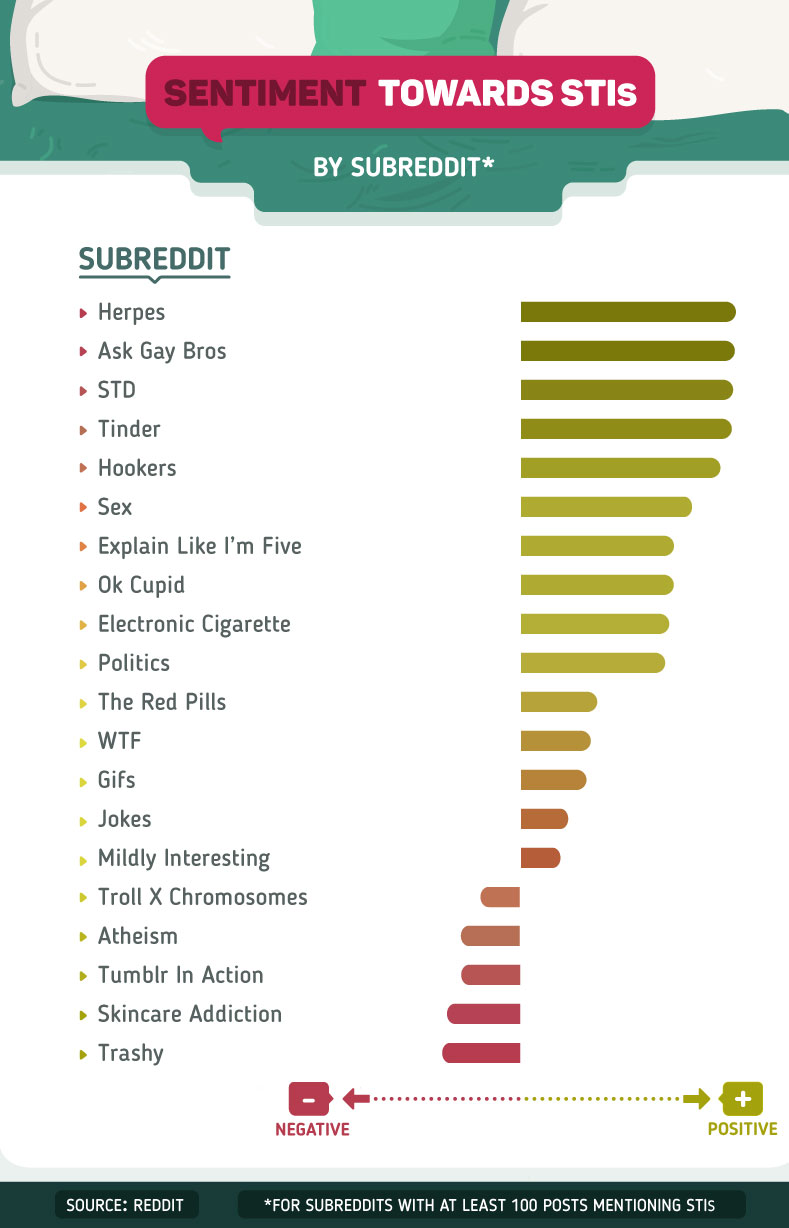
More than one million sexually transmitted infections are acquired every day worldwide.
Unfortunately, some reports suggest that fewer than one-third of people are routinely tested for these conditions, which may have contributed to their rise over the last decade. Diagnoses of infections, like chlamydia, gonorrhoea, syphilis, and herpes, are more common than you might think – making sex health education that much more important.
With millions of people across the U.K. and U.S. living with an STI today, we polled 2,000 participants to understand which STIs are perceived most negatively and how they affect people’s sex lives and the opinions of those around them. Starting the conversation on STIs and how they can be treated or managed – as well as prevented – may help reduce their growing impact. Read on to see what we discovered.
The Danger Zone

In 2015, over 200,000 people in England were diagnosed with chlamydia, making it the most common STI in the country. So when we asked survey respondents from the U.K. which STI they felt was the most severe, they voted chlamydia the highest over other conditions like herpes and gonorrhoea.
Because symptoms of chlamydia can be discrete, many who have it don’t immediately know that they’ve contracted it. Pain when urinating, unusual discharge, and abnormal bleeding are a few signs that may indicate you need to be tested. Fortunately, some antibiotic treatment is 95 percent effective in treating chlamydia, and consistent condom use can significantly reduce the risk of passing STIs, like chlamydia, from one person to another.
In the U.S., syphilis was considered the most severe STI. Recently, rates of syphilis in the U.S. (along with chlamydia and gonorrhoea) increased for the first time since 2006. Some doctors are attributing this rise to the growing popularity of dating apps, which may be changing the general attitude towards casual sex between multiple partners. Even though our U.K. respondents regarded syphilis as the least severe STI, rates in the region rose by 33 percent in 2014 alone.
STI Stigmas

With the rate of many STIs continuing to rise, we asked our U.K. and U.S. respondents how these conditions would affect current and future relationships.
Both groups of respondents told us they largely would not start a new relationship with someone who they knew had an STI – nearly 69 percent in the U.K., and roughly 72 percent in the U.S. Fortunately, despite this attitude, many STIs can be successfully managed with appropriate medical care, while the correct use of condoms can significantly reduce the likelihood of transference.
For existing relationships, over half of our respondents in the U.S. told us they were more likely to leave a partner who admitted to having an STI than those in the U.K., where over 56 percent said they would continue the relationship. Youth education in the U.K. has largely been focused on reversing inaccurate stigmas around STIs, including treatment as well as prevention, which may help improve perceptions towards partners with certain conditions.
Despite admitting their concerns with being in or starting a relationship with someone who has an STI, over 62 percent of U.K. respondents told us they don’t ask new partners if they’ve ever tested positive for an STI. Comparatively, only 42 percent of survey takers from the U.S. told us they refrain from asking their partners if they’ve been tested. Ordering at-home test kits is a discreet and convenient way to test yourself for an STI and to start a positive conversation between you and your partner around sexually transmitted infections.
Let’s Talk About Condoms

When we polled respondents about the likelihood of them having protected sex (using a condom) with a partner who they knew had an STI, over 63 percent of men and 60 percent of women in the U.K. told us no.
In the U.S., results were slightly more varied. Over 61 percent of American women still identified that they would not engage in intercourse with someone who admitted to having an STI, but under 19 percent of American men told us an STI would have a negative impact on their decision to have sex.
Protected sex with a condom is highly effective in preventing the transmission of common STIs and can allow the thousands of people infected to continue having happy, healthy sex. Unfortunately, many participants (around 50 percent) in both the U.S. and U.K. admitted to having more unprotected sex than protected, which can promote the spread of STIs – especially between partners who may not realise they’ve contracted one. Some studies have suggested that getting tested for STIs, like chlamydia, can help promote sex education, as well as condom usage and continual testing thereafter. Despite some common misperceptions, these tests can be inexpensive, convenient, and pain-free.
Platonic STIs

Despite many respondents admitting they were less likely to start or continue a relationship with a partner who they knew had an STI, we asked how they would feel if they learned that people close to them had contracted one of these infections.
When it came to friends, 82 percent told us they would not think less of a mate who they discovered had an STI, and 78 percent would not think any differently of a family member with one. In the workplace, 80 percent acknowledged they wouldn’t think poorly of a co-worker who’d contracted a sexually transmitted infection, and 76 percent felt the same way about a boss.
These responses generally indicate a lack of negativity felt towards those who’ve caught an STI. In fact, reducing the stigma around STIs has been a major health priority in the U.K., particularly around high-risk groups like young people and the men who have sex with men (MSM) community. Beyond promoting positive sex health education, reducing these stigmas can also help reduce the barrier for seeking medical attention.
Internet Perception

In an attempt to understand more than just the attitude towards people close to our survey participants, we scoured the online community forum Reddit over several months to see how certain groups react to STIs.
Certain subreddits – forums categorized by areas of interest – responded more positively towards STIs than others. Groups like Herpes, STD, Sex, and Explain Like I’m Five had a more favorable sentiment towards STIs. Forums with a specific focus on these infections and their symptoms may be more likely to provide general education without the negative stigmas attached to acknowledging one's condition. Other groups like Ask Gay Bros and Tinder also had higher a likelihood of positive sentiment.
Subreddits like Trashy, Skincare Addiction, Tumblr In Action, and Atheism had a more negative sentiment towards STIs.
Healthy Conversation, Healthy Sex
Understanding your partner's sexual health – as well as your own – is an important part of promoting healthy sexual habits. Don’t let fear or embarrassment get in the way of having an open conversation about your sexual health and any sexual conditions you may be experiencing.
As we discovered, some STIs are more negatively perceived than others, and while those who participated in our survey revealed that the presence of an STI was more likely to negatively affect their decision to engage in sexual activity, it did little to impact their opinion of friends, family, and co-workers.
Increasing the conversation and education around sexual health and STIs can help prevent the spread of undiagnosed infections and reduce the stigma surrounding the thousands of people every year who contract an STI. At Superdrug Online Doctor, we are committed to providing you with the best prescriptions and information for treatment, care, and prevention. Visit us online today for a convenient STI test kit delivered discreetly right to your door, or treatment options to help you manage many of the most common STIs. Visit us online to learn more.
Methodology
We surveyed 1,000 people in the United States and 1,000 people in the United Kingdom to find out their perceptions and opinions on the various sexually transmitted infections mentioned within this project.
Fair use statement

If you have any questions, please contact [email protected].
Sources
- https://assets.publishing.service.gov.uk/government/uploads/system/uploads/attachment_data/file/559993/hpr2216_stis_CRRCTD4.pdf
- https://onlinedoctor.superdrug.com/chlamydia-treatment.html
- https://www.cdc.gov/nchhstp/newsroom/2015/std-surveillance-report-press-release.html
- http://www.bbc.co.uk/newsbeat/article/34008736/dating-apps-increasing-rates-of-sexually-transmitted-infections-say-doctors
- https://www.cdc.gov/std/chlamydia/stdfact-chlamydia.htm
- https://www.bashh.org/documents/Sexually%20Transmitted%20Infections%20in%20Primary%20Care%202013.pdf
- https://assets.publishing.service.gov.uk/government/uploads/system/uploads/attachment_data/file/142592/9287-2900714-TSO-SexualHealthPolicyNW_ACCESSIBLE.pdf
- https://onlinedoctor.superdrug.com/sexual-health-clinic.html
- https://www.independent.co.uk/life-style/love-sex/11-myths-about-sexually-transmitted-infections-10116030.html
- https://www.cdc.gov/condomeffectiveness/brief.html
- https://assets.publishing.service.gov.uk/government/uploads/system/uploads/attachment_data/file/488090/SRHandHIVStrategicPlan_211215.pdf
- https://www.who.int/en/news-room/fact-sheets/detail/sexually-transmitted-infections-(stis)